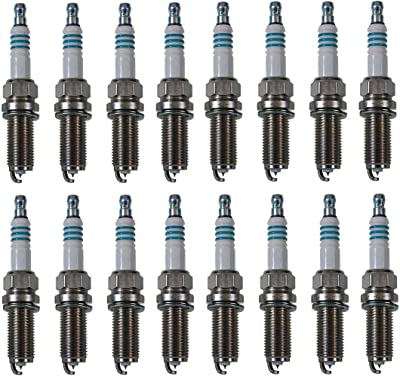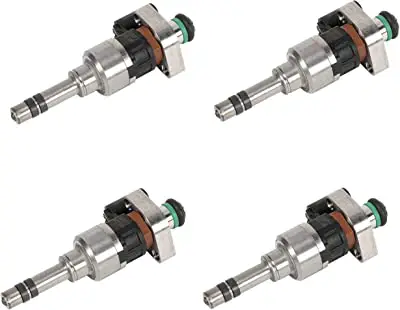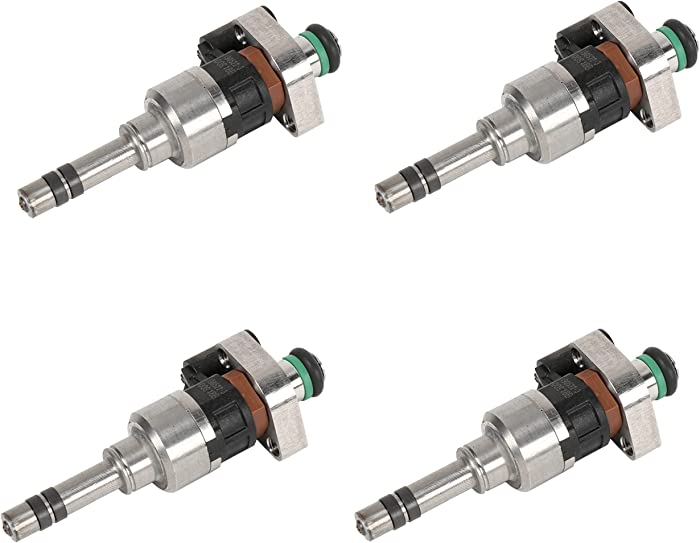Spark plugs and fuel injectors are two distinct technologies for igniting the air/fuel mixture. Fuel injectors are more technologically advanced and used in modern diesel engines. Meanwhile, Spark plugs are mostly used in gasoline engines and are suitable for both old and new types of engines.
Both are great methods of engine ignition however, users tend to choose spark plugs more than fuel injectors. Because most cars still use gasoline engines. Gasoline is lighter than diesel, it requires a spark rather than pumping. Also, spark plugs are easy to install and less cheap than fuel injectors.
In terms of reaching a conclusion ‘spark plugs vs. fuel injectors’ debate is tough. They both play a significant role in a vehicle’s engine. Why they are different and what types of jobs they do we can only understand if we look at the differences between them in detail. This article aims to provide you with the key and major differences between these two systems.
What Is a Spark Plug?

A spark plug simply generates electrical lighting or a spark that is sufficient enough to jump the plug gap by firing the air/fuel mixture in the internal combustion engine to start the vehicle. This component is considered the heart of a gasoline engine.
Jean-Joseph Etienne Lenoir, a Belgian engineer, first invented the spark plug, in 1858. His plugs are commercially successful. Though many argue that Edmond Berger invented spark plugs in 1839, however, it turned out to be a false assumption. Moreover, according to the USA patent records the spark plug design was not his invention.
Spark plugs are used in gasoline engines, located on the top of the cylinder. They are made of a metal threaded shell, a porcelain insulator, and a center electrode. Some electrodes consist of a resistor but not all of them. This component has two major roles: to ignite the air/fuel mixture and to remove heat from the combustion center. Sparks plugs are important for:
- Acceleration improvement
- Efficiency on fuel
- Smooth engine performance
- Avoid misfire
- Low rate of emission
- Reducing the risk of interfering with other functions and so on.
What Is a Fuel Injector?

The fuel injector is a key component of your car. In basic forms, fuel injection is a system for metering fuel into an internal combustion engine, where the fuel is burnt in air to release energy in the form of heat, which is then transformed into mechanical work by the engine using the gas laws.
The first Fuel injections received a patent in 1872 for George Bailey Brayton. He invented the system where the internal combustion engine uses the pressurized gas method as fuel injection. The air-blast injection was also invented by Brayton. Following the footsteps of Braytonan, in 1894 Rudolf Diesel improved the method and used air-blast injection for the diesel engines.
Fuel injectors are made of margarine or carburized steel and nitride. They atomize the fuel by forcing it via a tiny nozzle at high pressure. The primary job of a fuel injector is to control the flow and pressure of fuel inside the internal combustion chamber. Fuel injectors are important for:
- Improving the quality of air/fuel mixture
- Avoiding the waste of fuel
- Increasing the mileage by burning fuel effectively
- Metering the fuel smartly
Spark Plugs Vs Fuel Injectors: Key Differences
| Comparison | Spark Plugs | Fuel Injector |
| Origin | The United States of America, 1889 | America, 1872 |
| Functions | To generate a spark for the ignition of charge inside a gasoline engine | It controls the amount and the time of fuel sprayed inside the diesel engine |
| Technologies | fuel injection technology is classified into four types: Single-point or throttle body injection, Port or multi-point fuel injection, Sequential fuel injection, and direct injection. | fuel injection technology is classified into four types: Single-point or throttle body injection, Port or multi-point fuel injection, Sequential fuel injection, direct injection. |
| Materials | Three basic materials- Copper, Platinum, Iridium, | Among the numerous modified spark plugs, mentionable ones are – double iridium, platinum+4, double copper, black onyx, and platinum-iridium. |
| Brands like- Edelbrock, Keihin, Woodward, Continental, DENSO, Magneti Marelli, and Delphi are famous for Fuel Injectors. | Prominent brands are- DENSO, ACDelco, NGK, Champion, Bosch, E3, and others | Appropriate materials for diesel engines like- maraging steel and nitride |
| Thermal conditions | The thermal range of any spark plugs should be hotter enough for burning deposits and colder enough to prevent fouling. | The fuel injector can withstand and control any heat range |
| Affordability | Manufacturers | Expensive but necessary |
| Necessity | Compulsory for all gasoline engines | Necessary for all diesel engines |
| Compatibility | Automobiles, household applications, bikes, marines. | Only for automobiles and bikes |
Spark Plugs vs. Fuel Injectors: Main Differences
The differences between spark plugs and fuel injectors rely upon their designs:
- Spark plugs generate a spark with the help of direct current(DC). Fuel injectors do not need electricity to create a spark. They compress the fuel inside the cylinder. Diesel engines need more pumping than gasoline engines therefore, fuel injectors are more common in diesel engines.
- Fuel injectors do not require any gap adjustments. Spark plugs have gaps which are generally 0.6 mm to 1.0 mm. The proper gap is important in plugs, with a proper gap spark plugs do not work effectively.
- We can divide spark plugs into three groups according to materials, such as copper, platinum, and iridium. Meanwhile, there are two types of fuel injectors based on engine configurations- diesel fuel injection and gasoline fuel injection. Margarine steel and nitride are used inside the fuel injector.
- Fuel injectors have two springs (plunger and main), and spark plugs have two electrodes(center and ground).
- Spark plugs are located on the top of the cylinder, whereas fuel injectors are located inside the diesel engine.
Pros and Cons: Spark plugs vs. Fuel Injectors
Pros:
| Spark Plugs | Fuel Injector |
| -Cold engine starting -Less harmful gas emission -Provide horsepower and torque to the engine -Smooth engine throttle -Constant spark and better acceleration | -Ensure maximum quality of air/fuel mixture -Reduce engine vibration Burn fuel effectively -Improve fuel economy -Ensure optimum power |
Cons:
| Spark Plugs | Fuel Injector |
| -Require scheduled replacement -Some coating can be brittle | -Expensive system -Need proper maintenance |
Which one is better?
It is really hard to choose anyone. Both spark plugs and fuel injectors are important and they work similarly in their responsibilities. Still, Spark plugs have the advantage that they are comparatively lower in price and easy to install. You can install spark plugs by yourself. But recently, many modern engines require diesel fuel injectors. For example:
FAQ
Are fuel injectors the same as spark plugs?
A Petrol engine has one or more Spark Plugs which are used for ignition in gas-fired motors. Diesel engines do not use sparks but instead rely on high-pressure pumps called Injectors to feed diesel into each cylinder as air meets compression at a constant volume so that it may be combusted with RPMs below 2k – this process creates power via chemical reaction without an explosion.
Can a bad fuel injector damage spark plugs?
When a bad fuel injector is leaking, it can cause carbon buildup and incomplete combustion that may damage spark plugs. If you notice an oddly sounding engine or check for unusual smells coming from your vehicle’s exhaust system then there could be something wrong with one of these crucial parts.
Do injectors replace spark plugs?
You can put the fuel in a cylinder with injectors, but you still need spark plugs to ignite them. Only Diesel is designed and built so that their compression will self-ignite all types of gas/ diesel mixtures for quicker starts or faster revving abilities without using any lubrication since there’s no oil involved.
Do cars with fuel injectors have spark plugs?
The only way to facilitate future optimizations in terms of performance, fuel economy, and emission reduction is by using spark plugs that are perfectly geared towards each combustion chamber.
Is it worth replacing fuel injectors?
When you factor in adverse conditions experienced by drivers and a lack of maintenance, most fuel injectors will need to be replaced every 50-100k miles.
Is it worth replacing spark plugs?
Misfiring sparks can cause a lot of problems, so it is best to change them whenever possible. This will help protect against costly repairs down the line.
Do gas engines have fuel injectors?
Whether it’s a gas or diesel engine, fuel injectors are crucial to the accurate delivery of all that energy. They provide better economy and power as well; virtually every modern vehicle with an internal combustion motor uses these little beauty shots for its optimum performance.
Do all gas engines have spark plugs?
Spark plugs are a type of component found only in gasoline engines. They provide an ignition source for combustion that sets off each cylinder’s sequence.
Final Words
By far we have understood that the spark plugs vs fuel injectors debate are endless. Both of them are necessary for automobiles. Though they perform almost similar types of functions, they are different in their design and compatibility. Before choosing any one of them you can remember the simple rule that is- ‘choose spark plugs if you have gasoline or SI engine and choose fuel injectors if you have diesel or CI engine.
See also:
- ACDelco Vs Champion Spark Plugs: Key Differences
- Motorcraft Vs NGK Spark Plugs: What is the Difference?
- Autolite Vs NGK Spark Plugs: Main Differences
- Copper Vs Iridium Spark Plugs (With Pros & Cons)
- Champion Spark Plugs Vs NGK – What Are the Major Differences?
- Performance Spark Plugs Vs Regular Spark Plugs

